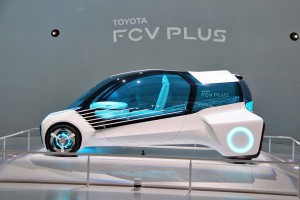
The Toyota FCV Plus cconcept is the sort of futuristic vehicle that could make use of AI breakthroughs.
Toyota will invest $1 billion to set up a new U.S. artificial intelligence and robotics research center over the next five years, the maker announced in Tokyo on Friday.
The new Toyota Research Institute Inc. will have offices in both Silicon Valley and Cambridge, Massachusetts, announced Akio Toyoda, President of Toyota and a grandson of the automaker’s founder. The facility will focus not only on ways to make driving safer but also on technology that can improve the lives of the elderly and disabled.
A key target will be to “improve safety by continuously decreasing the likelihood that a car will be involved in an accident,” explained Dr. Gill Pratt, the CEO of the new venture. It also aims to “make driving accessible to everyone, regardless of ability,” while also applying technology “to indoor environments for the support of seniors.”
The facility should also pay dividends by improving production technologies, an area in which Toyota has long been the benchmark manufacturer.
The new Toyota Research Institute will act as a bridge between advanced research and practical applications, according to the automaker. Pratt, who will run the operation, was a pioneer in robotics and autonomous vehicle research. He previously led the Defense Department’s DARPA Robotics Challenge which focused on the development of semi-autonomous robots that could perform complex tasks in dangerous environments.
The new facility will be up and running by 2016 and hopes to draw researchers and engineers from major universities including MIT and Stanford. Toyota recently announced a joint effort with those two learning centers, each receiving $50 million AI grants.
(For more on that joint project, Click Here.)
“As technology continues to progress, so does our ability to improve products,” said CEO Toyoda. “At Toyota, we do not pursue innovation simply because we can; we pursue it because we should. It is our responsibility to make life better for our customers, and society as a whole.”
The project will result in some proprietary efforts but also plans to conduct open and collaborative research, as well, Toyota officials promised.
Artificial intelligence and related fields, such as robotics and autonomous driving, have made major strides in recent years, and there has been significant interest within the automotive community which sees plenty of opportunities both on the assembly line and on the road.
(Click Here for a look at Toyota’s hydrogen-powered FCV Plus concept vehicle.)
Toyota, which recently regained its crown as the world’s best-selling automaker, has been one of the more skeptical of the major manufacturers when it comes to autonomous driving. It has emphasized a goal of “assisting” drivers, rather than taking complete charge of the vehicle. But it appears to be broadening its focus as competitors ranging from Nissan to General Motors, Toyota and Daimler AG begin to move closer to putting self-driving vehicles on the road.
Nissan CEO Carlos Ghosn declared during a Tokyo Motor Show preview last week that the company will meet its goal of putting its first fully self-driving vehicle into production in 2020.
That said, the Nissan officials overseeing the project last week told TheDetroitBureau.com that the complexities of reaching that goal in time will require significant efforts in the development of artificial intelligence.
During the Tokyo news conference, research chief Pratt noted three personal episodes that led him to focus on AI research. As a child, he saw another boy killed by a car while riding a bike. As an adult, he had to take the car keys away from his father at the age of 83, and then move him to a nursing home a year later.
Autonomous vehicles could help seniors maintain their mobility much later in life, whether by assisting them in driving or by completely taking over driving duties.
But some of the same underlying technologies could find a place in the home and workplace environment, as well. Toyota is just one of several auto manufacturers working on personal mobility concepts. Honda, for one, showed off several concepts during the Tokyo show, including the Wander Walker and Wander Stand, that could assist those with disabilities.
(Nissan IDS concept previews upcoming autonomous battery car. Click Here to check it out.)

